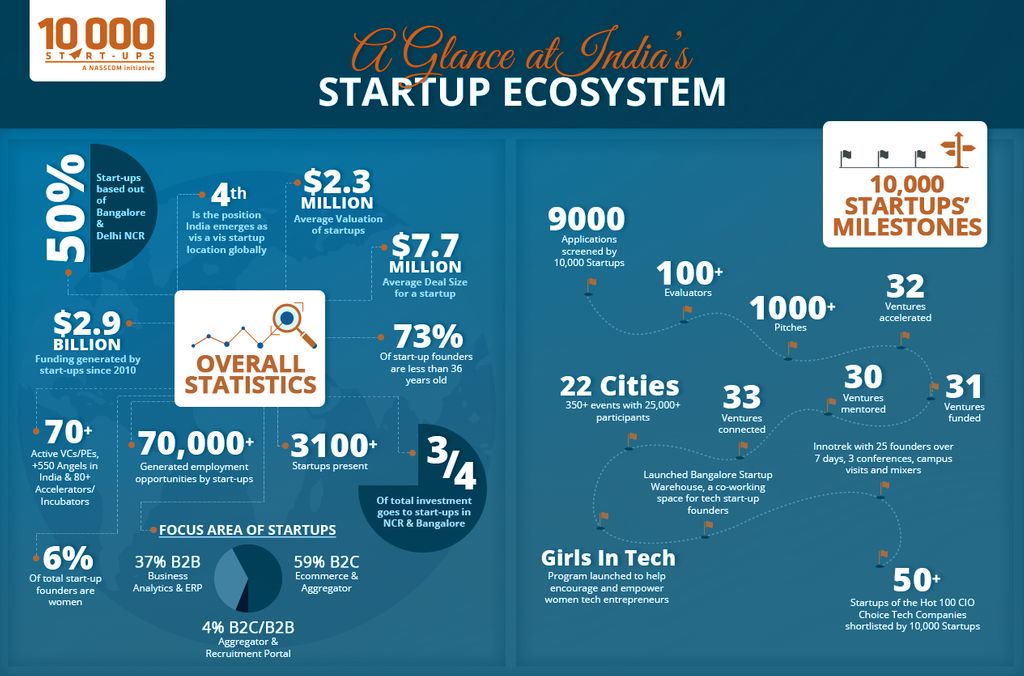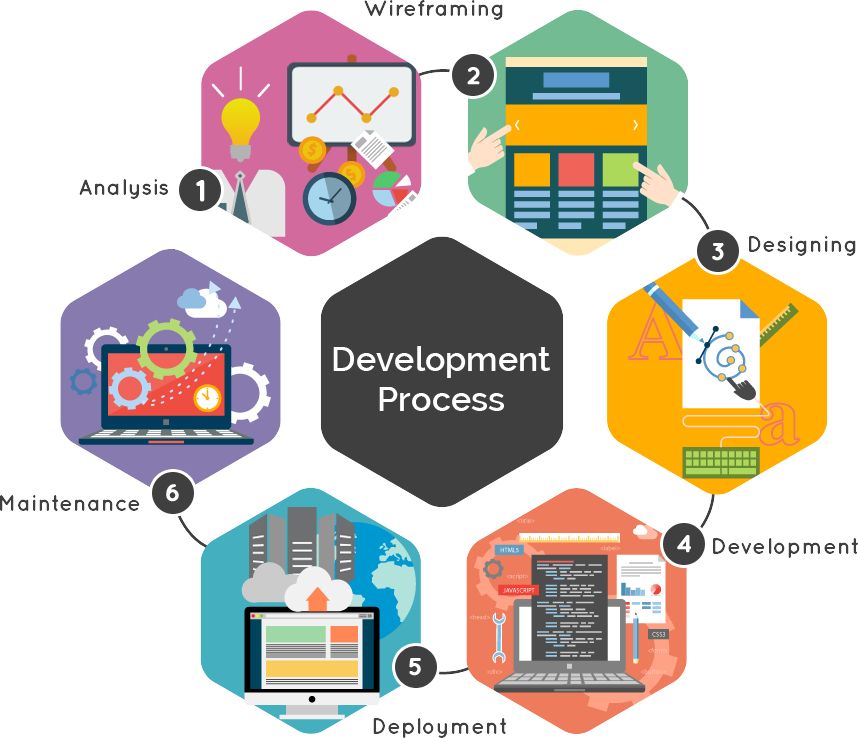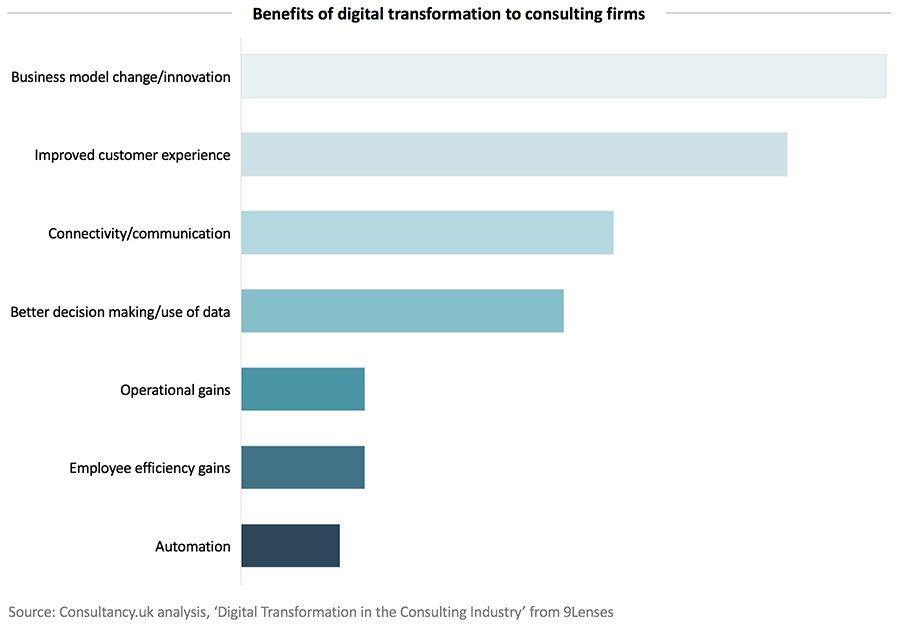Startup Ideas In India
Aug 22, 2019 • 447 views
With a population of over a billion people, India has been rapidly expanding its business opportunities to become on of the biggest startup hubs in the world. With over 2800 startups launched in 2018, India has become a promising market for investors.
According to NASSCOM Startups in India have witnessed 108% growth in their funding in 2018.

The startup ecosystem in India is diverse yet competitive. It is essential for certain characteristics to exist for startups to progress in India -
• The product or service provided should be unique to the company. Investors and customers should be able to differentiate the startup's products and services from those in the existing markets.
• A startup must always strive to provide value for money and gain competitive advantage in order to grow and overcome rivalry pressures.
• To avoid hiccups, the business framework should be
well-planned. All external/internal factors and key stake holders should be considered before launching the startup.
• The idea should be practical and profitable for it to be put into action. Simply having an idea is not enough, for the startup to bloom, it is important that the idea should be commercially viable and remunerative.
• The idea should be attractive for investors. Nobody enjoys burning money without promising future returns.

1. Food industry - restaurant
India is known for its variety of delicious food. Food industry in India has a billion dollar market and is regarded as a promising industry around the globe.
Dine-ins are restaurants that offer food within the outlet. New dine-ins which integrate multiple outlets along with availing sport facilities such as football turf, are a rising trend throughout the country.

Food through tech; Source - pymnts.com
Drive-ins are restaurant that provide food take-away services on car driveways. They are a potential opportunity not yet taken up widely in India.
One of the most successful startups in the food industry is Dineout. It has built a platform for successfully booking tables, ordering food and more. They eliminated the waiting system and improved customer convenience, which helped them to grow rapidly across India.
2. Data management.
The rise of the internet globally has created a plethora of information that needs to be appropriately analyzed to be converted into data i.e useful information. All kinds of businesses use online information to calculate various parameters in their business.

Data management framework; Source - blogs.sas.com
The job opportunities under data management are
I. Data analyst
II. Data scientist
3. Handicrafts
According to the National Council For Applied Economic Research, Handicraft industry in India witnesses 20% growth each year. The handicraft industry has a wide customer base in India especially targeting women.India contributes 1.2% in the $100 billion dollar industry worldwide.
From hand printed textiles to embroidered goods, India's handicraft industry has a vast scope in the future. Gaatha is one of the many handicraft startups that are growing rapidly in present times.
4. Rent clothing
Rent clothing is one of the barely explored sectors of the fashion business.Renting clothes is often a better alternative than buying clothes that are worn on rare occasions.

Source: greenbiz.com
In spite of the nature of business, superior fitting is an essential and desirable feature along with quality and price for determining brand position in the market in the fashion industry.
5. Web and App development
Most businesses today, have their official website or Applications that they use, to build direct interface platforms. A business providing a singular platform for managing multiple websites is seen as potential outsourcing client. Businesses handling subscriptions along with front-end and back-end development is also in high demand.

Website and application development process; Source- web.udyogmart.com
A single base for development of different websites and applications will lead to specialization and will also require high data security care.
6. Online consultancy
With the internet providing the platform for most people to look for solutions, online consultancies are the most viable options for people who seek help.

Online consulting advantages; Source- Consultancy.uk
An online portal that provides expert advice and consultancy services 24/7 for matters varying from psychological advice to financial help can aid to this need. This portal could act as a link between freelancers around the world .
7. Travel agency
Many companies integrate several transportation alternatives online. But, offline travel agencies mostly conduct their own businesses.

Travel agency model; Source - Shuttesim.com
Advancement in travel agency business by offering budget packages for price sensitive buyers using an effective mix of all options online and offline can reduce convenience fees and become a glowing business.
8. Blogging

Source - 123rf.com
Every company dealing on the internet desires to maintain their social profile. Whether it is product information or general content, blogging is a unique skill run after by website managers. A creative methodology for connecting bloggers, brands and markets with each other will be highly attractive for users online.
IndiBlogger, now a 1 crore venture was launched in 2007 and links brands to bloggers through blogging contests and more. Read more about IndiBlogger here.
9. Online tech support

Source - processmaker.com
Most official service centers of tech brands charge unreasonable prices and make it unfavorable for customers to visit them for support.
Customers would rather choose a systemized platform providing valuable solutions to generic tech problems along with door-to-door repair service with free pick-up and delivery. Elimination of middlemen is the main target for new tech support companies as this brings cost-effectiveness for consumers and buyers.
10. Automobile services

Source - mysoftwares.org
With an expected growth of 65% in the next few years, auto service industry is a breeding ground for most businesses today.
Current trends in auto service industry are -
• Pick-up and drop to service centers
• Platform for sale of second hand vehicles
• Doorstep modifications
Investor approach
The principal factor that determines how a start-up will progress is investment. A startup idea should be unique, future-oriented and economic, for it to convince investors to fund their money.
Startups mat require funding at different intervals of time -
a. Pre-seed funding or Angel funding
b. Seed funding
c. Series A, B, C and D.
Pre-seed funding are funds for promoters to facilitate kicking-off business operations, while seed funding is the first official equity funding stage. Start-ups may opt for further funding to develop and establish their user base and product.
For a company to avail series funding, it is very important for the investors to believe that the company has a high potential and can maintain a consistent track record in the market.
To know more about seed funding, click here.
Investor criteria
Before confirming deals with investors, a startup should be well-versed with the deals of the investment. There are several factors that drive an investment deal apart from the product -
• Equity stake – Every investor opts for a percentage of equity share of the business as their stake. This comes as a prerequisite investing.
Stake in the business determines the influential ability of the investors to make or alter decisions taken by the entrepreneurs and also their share in profits.
It is important for startups to carefully examine these matters before proceeding further.
• Size of the market – Investors usually offer money to those entrepreneurs who have a potential to turn their startups to big companies in the future. Size of the market is a huge determinant for future growth of the company.
• Valuation - In theory, entrepreneurs choose a high valuations for their company to own higher shares in their startup. Investors on the other hand, follow exactly the opposite.
If a startup chooses high valuations, satisfactory future growth must be visible to the investors to avail further funding.
Why should I opt for startup in India?
Startups in India enjoy several benefits that boosts the rationale behind launching a startup over other job opportunities.
• Cost reduction - The Government of India pays for all the facilitator fees but not for the statutory fees in behalf of the startup. This can be seen as an 80% relief in the patent costs for a startup.
• Easy registration - The Government of India has also launched a mobile app and website for simplifying the process of registering new startups.
• Tax holiday - Startups are exempted from paying income tax for 3 years since registration, provided they are certified by the Inter-Ministerial Board (IMB).
There are numerous more benefits provided to the startup ecosystem by the Indian government, click here to know about them.
Factors of success
Time and money
Startups are designed to grow rapidly but need not necessarily provide visible gains instantly. It is necessary for every startup to have patience and believe in their business service and products. Return on investment (ROI) can be low during the initial years of the business.
Risk
A startup carries enormous risk right from their seeding stage. Every startup faces regular obstacles that they need to overcome in order to boost their company and move further towards becoming a big company in the market.
People and team
It is important for a startup to hire bright minds that are aligned with the vision of the company. Employing the right people and working as a team will boost creativity and improve performance of the startup.
